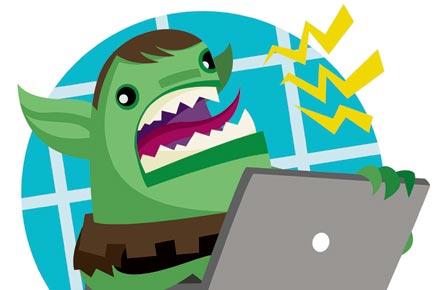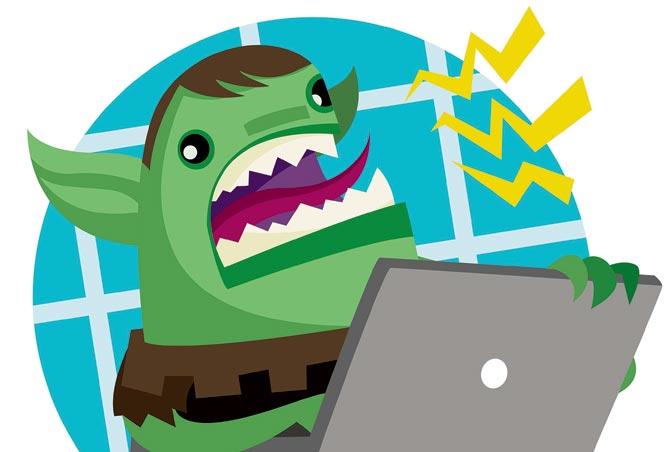A way to handle anonymous online trolls could be to troll them right back. Well, I wouldn’t know. But it’s worth trying for a day!


A troll is defined as “a person whose sole purpose in life is to seek out people to argue with on the Internet over trivial issues.” Representation Pic/Thinkstock
ADVERTISEMENT
 So, I see filmmaker Anurag Kashyap create a sh*t-storm of sorts on Twitter with the bait: “My New Year resolution: The more the ‘Bhakts’ troll me, I’m going to troll the Boss. Let’s play Troll-Troll.” As New Year resolutions go, this sounds suicidal. One day in the year may not be so bad.
So, I see filmmaker Anurag Kashyap create a sh*t-storm of sorts on Twitter with the bait: “My New Year resolution: The more the ‘Bhakts’ troll me, I’m going to troll the Boss. Let’s play Troll-Troll.” As New Year resolutions go, this sounds suicidal. One day in the year may not be so bad.
For, who is a Twitter troll? And Kashyap’s referring to the political types clearly—whether you call them ‘Bhakt’, ‘Libtard’, ‘AAPtard’, ‘Sanghi’, ‘Congi Chamcha’, whatever. If only we were so cued into partisan politics, we’d not be in the state we’re in.
Troll, by Urban Dictionary definition, is “a person whose sole purpose in life is to seek out people to argue with on the Internet over extremely trivial issues.” Some of them are probably ‘bots’, designed to suppress dissent while many are bought. If there is political patronage involved, it certainly deserves investigation.
The others, I’m sure, couldn’t be as angry as they appear on Twitter. Just as you can’t possibly be as happy as you seem on Facebook, which might still make sense. Online, we project our finest image to the world (no matter how screwed up our lives). And most of our world is centred on the holiday, the cat or baby at home, and the Rumi or Murakami quote that makes us sound profounder than usual. Frankly, Facebook adds the disco into discourse.
But what’s up with Twitter? Why’s it faker? There are apparently 30 million Indians on it. For companies and public figures, it is a fine broadcasting tool. Most of the hard-core regular users at verbal war, I’m told, are somewhere between 18 and 35, chiefly quiet blokes otherwise, mainly in mundane jobs, several of them settled abroad, putting coarse into discourse, deluded by their power to speak hurtful truth to the mighty, with no additional responsibility of getting facts or grammar right—now that’s supposed to be the job of journalists. But they hate journalists.
The mainstream news media, referred to as “presstitutes”, take their voice seriously still. Confusing fakery for feedback, some of the news media have begun turning into “presstitutes” themselves. Stuff on Twitter at worst goes viral. Distorted info and history shared on 160 million Indian phones individually through WhatsApp is, in comparison, a malignant tumour—a disturbing news crisis.
And I’m going by anecdotal evidence here. How does one verify data based on so many Twitter handles with literally eggs on their face, a whole other set, evidently low on life and self-esteem, hiding behind images of celebrities, politicians, the national flag each of them with hardly any followers, but following, tweeting, trolling a whole bunch through the day?
So much for demographic dividend. This is India’s disguised employment rate. Still, just imagine for a second, a fully grown adult, possibly a parent or college kid, on his seat, before a computer/smartphone, surveying Twitter, looking for who to go after, patiently typing, non-stop, one after the other, “Teri maa ki #%@&, Porki, bho*&#% ke, ga*#* maar doonga, behenke %$#&, chu$@#%, aaja maad*#^$#*.”
And then he eyes women on the screen, and goes after with renewed vigour, “Slut, saali r@%*, will r*$@ you, ch*&#, kapde utaar.” And another. Yet another. Almost everyday. This isn’t one person you see. It’s a sedentary army out there—seething in frustration, sexual and otherwise.
Sure, freedom of speech is indivisible. Hate speech is preferable to phoney political correctness. At least it marks you out. Well, not when you’re safe in the anonymity of a mob. Absolutely the only reason some anonymous trolls aren’t rapists and murderers is simply because it’s illegal. I’d be scared to raise children in a society with such a fat underbelly. You can’t see it. But every day, you’re aware it exists. Social media is a terrifying sample size.
A political/religious/social outfit, a movie star or national leader merely gives trolls a higher meaning, when none exist in their own life. Is it an Indian thing? Veteran Al Jazeera anchor Mehdi Hasan, upon interviewing Ram Madhav (then with RSS, now with BJP), tweeted in December 2015: “The past 48 hours of abuse have taught me that (Britain and Israel’s ultra-Right Wing) EDL’s, Likud’s, and Trump’s supporters have got a lot to learn from the ‘Hindutva’ crowd online.”
Arthur Crawford wrote of Indians in Reminiscences Of An English Police Official (1894): “I’ve come to the conclusion that by far the worst feature of native character is vindictiveness, and that it accounts for nearly all the worst crimes in the calendar. The slightest thing arouses it, and it stops at nothing. Its favourite arena is the criminal court, its favourite weapon anonymous accusation.
I wonder how many anonymous letters are received in public offices in India in a single day, and how many of them have the smallest foundation of fact!”
True? Probably not. But as someone who is being ‘nationalist’ today, it is my duty to defame fellow nationals, senior and distinguished citizens, past and present, call them names, malign them in public. Yup, I’m trolling you, Mr Troll.
Mayank Shekhar attempts to make sense of mass culture. He tweets @mayankw14. Send your feedback to [email protected]
 Subscribe today by clicking the link and stay updated with the latest news!" Click here!
Subscribe today by clicking the link and stay updated with the latest news!" Click here!






